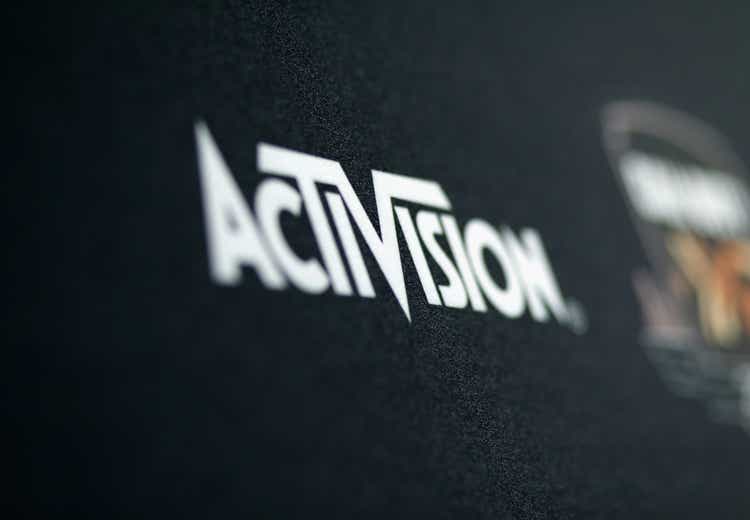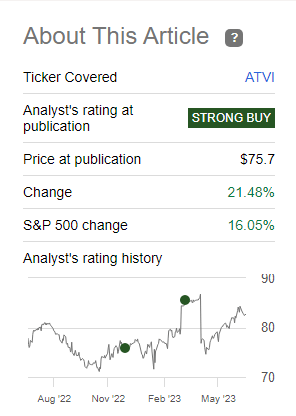Summary:
- Trading North of $90, most of the Activision merger-arbitrage gains have been realized.
- The additional $3-$4 that investors can make holding for an additional week are more than matched by the amount of uncertainty caused by regulatory objection to the deal.
- Other merger arb targets might be worth of investors’ time and money, given this deal will have implications for them as well.

Rich Polk
I have fond memories of the Microsoft-Activision (MSFT)(NASDAQ:ATVI) merger. My first article on the topic is still my most-read article on Seeking Alpha. Back in June of 2022 there was serious doubt over whether this deal could obtain regulatory approval. The argument I made was that the deal would likely pass based on the 2020 Vertical Merger Guidelines, which is one of the document regulatory agencies would use in evaluating the merger’s impact on the gaming market.

Activision’s stock languished below Microsoft’s purchase price 1.5 years ago (Seeking Alpha)
Now with the stock trading above $91 a share, there is a bit more clarity, but not enough to justify holding on for the additional $3-$4 per share. That is especially true given the Microsoft’s acquisition bid expires in July 18, just a week from today. Note that the deadline does not mean the acquisition will close in a week, it simply means that both parties to the acquisition could choose to walk away from it after that date. In other words, waiting that extra week doesn’t impact the regulatory process, doesn’t increase the chances of making the additional $3-$4 and only increases the risk of renegotiating this deal. The latter is almost certainly won’t happen, but why take my word for it when investors can sell now for a sizeable beat of the S&P 500. Not only did this investment outperform the S&P 500 when it is up double digits, it provided protection to the drawdown the S&P 500 endured in the second half of 2022. It was truly one of those rare convex opportunities, and its simply time to say thank you and good bye.
Why Selling Now Makes Sense
The stock is up more than 11% today on reporting from CNBC’s David Faber that the deal could close sooner than the deadline on July 18. That built on earlier reporting that the company sealed a legal victory in the US, with a US court rejecting a request from the FTC for a preliminary injunction to block the deal.
It makes all the sense in the world for investors to rush and buy ATVI when the stock was selling at fractionally more than $82 a share. There might be some sense in holding on for an extra week to get those extra $3-$4, though I consider that greedy. But there is certainly no need to buy it now on the hope of making 3% to 4% a week when the downside can be drastic.
Microsoft, Activision, and the United Kingdom’s Competition and Markets Authority (CMA) agreed to request pausing litigation, which the market took to mean that the parties are close to an agreement. According to Faber’s reporting, that agreement involves Microsoft making a divesture of one of Activision’s properties, which we don’t know what it is. Regardless of the details, investors who bought the stock should look to cash in now.
One thing that might be worth investors time however is researching other merger arbs that will be somewhat affected by the Microsoft-Activision merger. One example is Amazon’s acquisition of iRobot Corporation (IRBT). The verdict of the Microsoft-Activision merger is likely to be an indirect verdict on the fate of the iRobot acquisition, given both deals share similar characteristics. That will be something worth looking deeply into once there is more clarity on the position of regulatory bodies.
Lessons Learned from the Activision-Microsoft Saga
I’d say I learned two lessons from the Activision investment. The first was the importance of patience in investing. ATVI was essentially flat to slightly down for the entire period since my first recommendation, and it was only in late March 2023 that it began breaking out.
The second lesson is that lesson one is really is to understand in theory but hard to implement in practice. The amount negative headlines that investors had to endure throughout the period would have made it very hard not to sell. That was even more true given the investment gave opportunities for tactical risk management (selling out of the shares when they were down given the S&P 500 was down even more).
So it seems to me that forming a thesis is the easy part (there are dozens of fantastic writers on Seeking Alpha and may be hundreds of great ideas on a monthly basis). It is sticking to the thesis and having firmness of heart and mind to know when to hold on and when to sell is where investment returns are made.
The story might not be over for Activision however, its acquisition by Microsoft will surely bring its own research and theses on the future of the gaming industry.
Conclusion
Investors who bought ATVI before July 11, 2023 in general should look to take their gains and move on now. For other investors who are looking to buy the stock now with the coast seemingly clear, beware because there were countless occasions were solid reporting turned out to be inaccurate, or that facts simply changed after. Regardless, it seems unnecessary to buy now given the risks and reward. Investors can’t make more than 4-4.5% in a week, but can lose may be more than 20% in the same period if things go south for Microsoft and Activision.
Analyst’s Disclosure: I/we have no stock, option or similar derivative position in any of the companies mentioned, and no plans to initiate any such positions within the next 72 hours. I wrote this article myself, and it expresses my own opinions. I am not receiving compensation for it (other than from Seeking Alpha). I have no business relationship with any company whose stock is mentioned in this article.
Seeking Alpha’s Disclosure: Past performance is no guarantee of future results. No recommendation or advice is being given as to whether any investment is suitable for a particular investor. Any views or opinions expressed above may not reflect those of Seeking Alpha as a whole. Seeking Alpha is not a licensed securities dealer, broker or US investment adviser or investment bank. Our analysts are third party authors that include both professional investors and individual investors who may not be licensed or certified by any institute or regulatory body.
